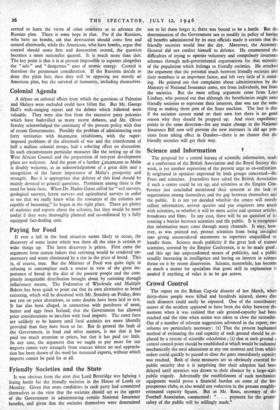Paying for Food
If ever a lull in the food situation seems likely to occur, the discovery of some factor which was there all the time is certain to wake things up. The latest discovery is prices. First came the argument from certain bakers that rationing would be rendered un- necessary and waste eliminated by a rise in the price of bread. This is, of course, true. But the Minister of Food was quite right in refusing to contemplate such a course in view of the great im- portance of bread in the diet of the poorest people and the com- pletely inequitable distribution brought about by rationing through• inflationary means, The Federation of Wholesale and Multiple Bakers has been quick to point out that its own alternative to bread rationing, which will be discussed with Mr. Strachey on Friday, does not rest on price alterations, so some doubts have been laid to rest. It has also been alleged, in connection with purchases of meat, butter and eggs from Ireland, that the Government has allowed price considerations to interfere with food imports. The exact facts are unlikely to be known until food statistics are more liberally provided than they have been so far. But in general the fault of the Government, in food and other matters, is not that it has paid too much attention to prices, but that it has paid too little. In any case, the argument that we ought to pay more for our imports comes very strangely from sources where no real apprecia- tion has been shown of the need for increased exports, without which imports cannot be paid for at all.






























 Previous page
Previous page